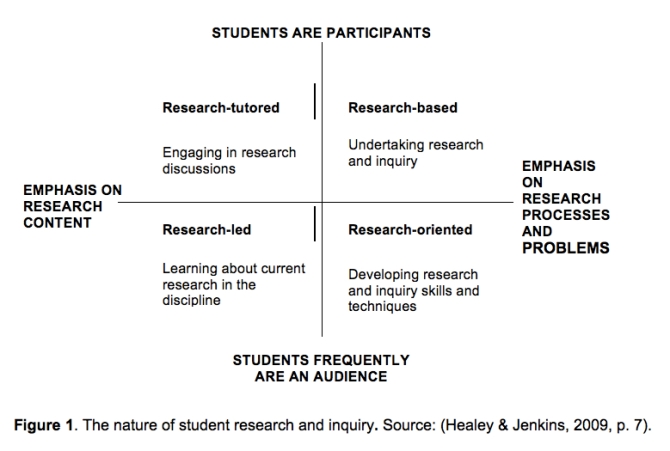
- university research often detracts from the quality of teaching (Pocklington and Tupper 2002: 7)
- courses taught by those at the cutting edge of research will necessarily be of higher quality than those taught by those merely using the research results of others – whatever the apparent quality of their style of delivery (Lee 2004: 9)
- there is clear evidence from a range of studies in different types of institutions of students valuing learning in a research-based environment (Jenkins 2004: 29)
- students are likely to gain most benefit from research, in terms of depth of learning and understanding, when they are also involved in research (Healey and Roberts 2004)
A range of terms is used in the literature, often interchangeably, to describe the research-teaching nexus. Griffiths (2004) suggests that a distinction might be made between teaching which is predominantly:
- Research-led: where students learn about research findings, the curriculum content is dominated by staff research interests, and information transmission is the main teaching mode;
- Research-oriented: where students learn about research processes, the curriculum emphasizes as much the processes by which knowledge is produced as learning knowledge that has been achieved, and staff try to engender a research ethos through their teaching;
- Research-based: where students learn as researchers, the curriculum is largely designed around inquiry-based activities, and the division of roles between teacher and student is minimized
- Research-tutored: top left quadrant, which, although not recognized by Griffiths (2004), is student-focused and emphasizes research content (see image above)
research is context specific and multidisciplinary rather than pure and discipline based; it has social relevance rather than being hypothesis led; it uses fuzzy, rather than empirically based data; it is problem solving rather than deductive. In what might be termed the commodification of knowledge, how knowledge is managed, synthesized and adapted become as important as knowledge itself (Jenkins and Zetter, 2003: 11)
References
Healey, M., 2005. Linking research and teaching: exploring disciplinary spaces and the role of inquiry-based learning. In Barnett, R (ed) (2005) Reshaping the University: New Relationships between Research, Scholarship and Teaching. McGraw Hill / Open University Press, pp.67-78
Image available here

Pingback: Teaching informed research (TIR) | connecting data to information to knowldge